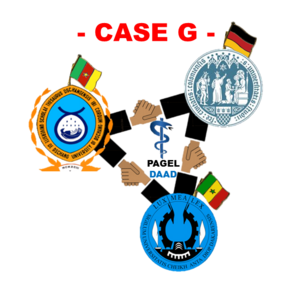PAGEL: CASE G
Program goals
The DAAD program aims to ensure that partner universities offer training and further education courses in the health sector that correspond to the local context and the state of the art in science.
In addition, development-relevant professional networks are established between students, alumni and experts in the health sector. Sustainable cooperation structures are also to be created between the participating universities and institutions.
On the German side, the universities want to expand their expertise in development cooperation as part of the PAGEL partnerships.
CASE G - Cameroon-Senegal-Germany

A case study of sub-Saharan medical curriculum development in a South-South-Alignement
With this project, the Medical Faculty (MF) of the University of Cologne (UoC) and the Faculty of Medicine, Pharmacy and Odonto-Stomatology (FMPO) of the University of Cheikh Anta Diop (UCAD) in Senegal are supporting the University of Dschang (UD) in Cameroon in developing the Faculty of Medicine and Pharmaceutical Sciences (FMPS), founded in November 2017.
Project goals in overview
The focus and first project goal of this project is on the development of a systematic and competence-based curriculum in human medicine at the FMPS, that corresponds to the local context and state of the art. For this purpose, the FMPS shall enter into the process of accreditation according to regional standards or shall successfully complete the accreditation. The process is monitored by the MF and FMPO according to the criteria of the "World Federation for Medical Education" (WFME).
The second project goal is to establish a development-related specialist network between academic and administration staff of FMPS, FMPO and MF in human medicine. Together with the FMPO, the MF forms an external advisory board to evaluate the progress of the curriculum development, which will be relieved by a local network under the leadership of the FMPO after the end of the funding phase.
The third project goal is to expand the MF's expertise in curriculum development in an African developing country, by the example of Cameroon. The MF is already exporting parts of its human medicine curriculum to Asia and North Africa. With this project, it expands the area of operation of its 3rd-mission by the sub-Saharan region.
5 activities
The project comprises five activities
- Workshop on curriculum development in Cologne for multipliers of the FMPS
- On-site assessments by the external advisory board of FMPO and MF at the FMPS
- South-South partnership symposia on faculty development in Dschang
- Qualification workshops of subject-related academic staff of the FMPS with a multiplier function in Cologne
- PhD qualifications of postgraduates of the FMPS at the FMPO in Senegal
related to the PAGEL funding modules 1 "Partnerships" and 3 "Alumni further training/Expert seminar".
Maximum entanglement
Each project activity generates 1-3 outputs, which serve the above mentioned project goals. Through this matrix-like entanglement of various activities and outputs, synergies of personnel and infrastructural resources can be used to keep the project costs as low as possible.
Due to the PAGEL funding, within four years an extraordinary impact can be achieved in Dschang, which will help the UD to be significantly more visible and also offers points of contact for subsequent projects in the following years. Moreover the project gains a positive relevance in terms of development policy through its thematic focus on improving medical care in rural regions of Cameroon, particularly in the western region, which is most affected by the influx of internally displaced persons as a result of the unrest between Anglophone and Francophone administration.